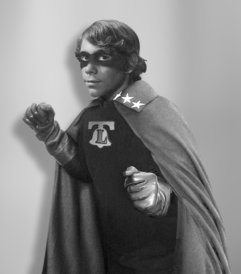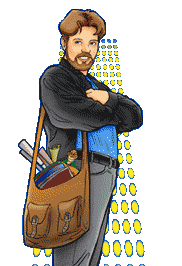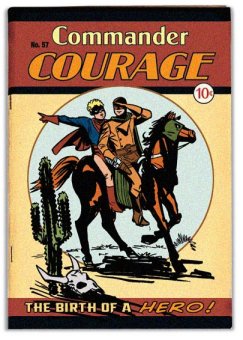|
An
Interview with Mark Hamill, part 2
|
|
|
Bill Mumy's
lost shot at liberty...
|
BACK TO PAGE ONE OF THE INTERVIEW
DM:
Was there anything else that you had to cut that just killed
you to do it?
MH:
It's probably better for the flow of the movie, but I loved
going to the documentary package about how the (Commander
Courage) comic book went through so many permutations. You
know, Courage in the Saddle, Courage to Love, Crypt of
Courage and all that.
I wanted
to have clips from the pilot, and instead we just have a still
with Bill Mumy playing Liberty Lad.
A lot
of it was because of the limitations of the amount of money
I had to work with. I staged that radio show down in San Diego.
I think you can hear it on the web.
DM:
Yes, we have it here on Fanboy
Planet.
MH:
All the minutiae about the career of Commander Courage and
Liberty Lad was interesting to me, because you could sort
of get a feel for the overall career. But there were so many
people in it, and so many aspects to it that if you expanded
that area, then other things had to come out.
To be
fair to everyone, including my partners, I had to keep the
balance. I mean, I had friends that did favors that were completely
cut out of the movie. All three of my children were in it,
but my children are cut out of it.
Wait,
my daughter Chelsea ended up in a deleted scene, because she
really wanted to be in it. My older son said, eh, I don't
care. They're blasé and did it as a favor to me. They have
no aspirations to be performers. Nathan works at Bongo Comics,
so he's in their booth. In one angle, you can see him over
Matt Groening's shoulder. He was sort of ambivalent about
being in it, so I just used another angle.
To each
his own.
DM:
With the radio show done live at the Con, you were able to
kind of sneak Maurice LaMarche and Rob Paulsen in, at least
in the extras. Was there anybody else that you wanted to have
in the film, and then couldn't fit?
MH:
I thought Jeff Bennett should be in it. He's a guy that works
all the time in cartoons. Pamela Segall, who's the voice of
Bobby Hill on King of the Hill and plays in a series
I do called Time Squad, with Rob Paulsen. I wanted
her desperately in the movie, and yet she was pregnant and
couldn't really do it.
There's
a whole list of people. I didn't even give Rob and Maurice
enough to do. I was trying to find a place for them to be
actors, but there was only so much I could do. Especially
when we had to do the bulk of it all in four days.
Everybody
pulled together, but at the end of the day, rather than going
out to dinner, parties, movies, or whatever people do at night
at the con, I was looking over the footage we had already
done. And then planning for what we were going to do the next
day. It was crazy. It was really exhausting.
Originally,
I was saying, maybe I shouldn't be in it. Maybe I shouldn't
be playing Donald Swan. We can get Jeff Bennett to do that
or Rob Paulsen. He's just a wonderful actor.
But I'm
pragmatic, too. They said, no, you've got to be in it, you're
a fan. It's your love of comic books that's driving this whole
thing. You really ought to be in it.
I envisioned
Leo Matuszik, the character Billy West plays, running through
the floor of the con in that costume. He's the soul we're
bartering for. He's being pulled by the movie people in one
direction, by the comic book people in the other direction.
But they (the producers) felt that with my background and
being known as a heroic character in George's franchise, it
was just too good to pass up.
You want
to give the people what they want.
And I
wasn't doing it for the glory. I really thought it would be
better for the story if it was Billy. I got outvoted, and
I can see their point of view.
But only
I could make a sponge-sculpted outfit look paunchy. There
are scenes where I come running around the corner where you
can swear I have a paunch. Now since the movie I've dropped
about twenty-five pounds, because I went off and did a play
(Six Dance Lessons In Six Weeks) and was dancing eight
times a week on Broadway and out of town. I went from a 35
waist back to a 32. I look at the footage and think I can't
believe what a Pillsbury Dough-Boy I am. But it seems right
for a guy from Wisconsin.
|
|
|
Donald
Swan immortalized...
art by Mark Teague
|
DM:
Was there a specific moment during the filming when you thought,
"this is working?" Because I'm sure there must have been times
when you thought it wasn't.
MH:
Oh, yeah. I don't think during it. During the con it was always
kind of scary. Then I went to the Cocoanut Grove in Florida
to rehearse Six Dance Lessons In Six Weeks. I really
had to put the movie aside until we opened.
Once
we opened, then I'd perform the show, come home, shower, have
something light to eat and then start watching footage. And
I'm telling you, it was scary, because you'd see all of this
stuff and think "this is so bad. I don't know how this is
going to work."
All of
a sudden, out of nowhere, there would be thirty seconds where
I'd be scribbling away going "oh, right! I could use this
reaction from here, and match it with this sequence over here."
It was
like slowly building something out of a big pile of Legos
that looked like a mess all over your room. It was somewhere
in the editing process. I knew the first thing we had to do
was assemble a narrative. Put the scenes in that tell the
story of what's going on in a chronological order, then we
can do the embellishments after.
That
first cut was almost four hours long. We knew it was going
to come way down from that, but we also had to figure out
what scenes we'd need to make sense of it all after we did
the con. Like the boardroom where I go in and meet all the
movie people (near the beginning of the film). That was done
much later.
I had
to get it all done when I still had the beard, because it
was coming off for the play. Any of the stuff we had to shoot,
we had to get quickly. It takes me forever to grow a beard,
plus it was tinted. I wanted it to have a sepia tone, that
was reddish-brown like an old faded scrapbook. I got the woman
who did my hair on The Flash, Lana Sharp.
That
was another wonderful thing. From Mike Richardson at Dark
Horse Comics, to Bill Mumy, to Greg Nicotero who I worked
with on John Carpenter's Body Bags, I was able to go
back to people that I knew and liked and built up some good
will with over the years. Not to do it for free, but give
me the best estimate on the low end, to see whether I could
afford them.
If I
hadn't written for The Simpsons comic, I don't know
whether I would have gotten Bill Morrison to draw the Golden
Age version, or Nathan Kane to do the revamped Codename: Courage
book.
All those
things add up. And then being able to have Bruce Timm and
Paul Dini from Batman. Even the actors who played Darth
Vader, Boba Fett and Chewbacca without their masks. I haven't
seen any of those actors in years. To see three of them all
in one day was a thrill. I said they had to do something,
just do a quick cameo. And we just made that up on the spot.
DM:
It is rumored that you've spoken to a couple of publishers
about doing Commander Courage comics.
MH:
I would love to do that. I asked whether or not we could do
it at Bongo Comics, and they said they really don't do unknown
characters. Which is kind of a Catch-22, because I said that
when the movie comes out, it'll be known.
I thought
maybe we could do an 80-page giant. The first 40 pages would
be the Golden Age version, and then you flip it upside down
and it's the stark version. I love that idea, and I'd still
love to do it. But there aren't any definite plans to do it.
DM:
If you were to do a sequel, what would it be?
MH:
I think it would be the story of pre-production on the movie.
It would still be about how you translated a printed character
onto the big screen. It would probably g more in the direction
of Robert Altman's The Player. I'd probably have writers
coming in and pitching ideas. I'd probably have interviews
with potential directors, people trying to get me to do an
MTV video of the character.
Just
more in the direction of it being made and how it's being
made.
The third
one would probably be the actual movie.
DM:
So you envision a trilogy? Because trilogies are hot.
MH:
(laughing) Yeah, trilogies are hot. It just seems that
the reason they work that way is because there's a beginning,
a middle and an end. They almost follow the structure of a
three-act narrative.
I'm really
open to ideas, and I'd love for the fans to contribute. They're
such a big part of this movie, that I'd love to get a dialogue
going, to find out what they'd like to see. I don't see how
we could go back to the convention. That's been done.
I think
it would be more of Donald trying to hold on to the integrity
of the character, showing the movie people footage from the
lost pilot and more of the cartoon. Try and show him imparting
the enthusiasm he has for the character in hopes of it becoming
closer to what he wants.
I don't
think Don Swan is so intractable that he would find changing
Liberty Lad to Liberty Lass an insurmountable problem. He'd
just want to make sure that there's no sexual tension between
them, because that's not what it's about in his mind.
The fans
usually have the best ideas. We've talked about it a little
bit, but nothing definite at this point.
DM:
You first approached Creative Light about doing The Black
Pearl. At the time, they felt it was something a bit beyond
their means. Are you still interested in adapting that for
film? Are you interested in directing again at all?
MH:
Absolutely. I wrote The Black Pearl to be a movie that's
enhanced by its low budget, rather than hurt by it. If we
could give it a real gritty reality, if somebody tried in
real life to do something that seems so effortless on the
printed page, what a disastrous decision that is. It's almost
like Fargo, except instead of hiring a guy to kidnap
his wife, he decides to put on a costume and things go drastically
wrong.
I think
it could be a really taut thriller, and I wanted to film it
with hand-held cameras for a real cinema verite style.
But it's
been fifteen years now. I hope that this (CB:TM) will
give me some momentum to go in that direction. I'm really
interested in continuing on, writing more and directing more
if I can.
DM:
What do you have on tap next?
MH:
The very next thing I have is a show called The Wrong Coast,
coming on AMC in March. It's a satire of what I call Hooray
for Hollywood shows, like Access: Hollywood and Entertainment
Tonight.
It's
all animated, and I play Jameson Bakewright, the host. He
has a sidekick, Debbie Sue. We show clips and trailers and
onset interviews and so forth. It's a satire that I think
is very funny. I don't have the exact date, but I know it's
sometime in March.
DM:
Every time you get some high profile in the news, people comment
on how you've "turned your back on Star Wars." When Comic
Book: The Movie sponsored Howard Stern last week, the crew
there went off on that topic. Now I know that's not true about
you, and people will probably still misinterpret your stance,
but would you mind making your definitive statement on that
for the thousandth time and probably not the last?
MH:
Not at all. I've sort of laid off over-associating myself
with the franchise only because it's such a healthy series
on its own. I really have nothing to do with the prequels.
I'm just a fan like everybody else.
I just
talked to George last week. He was in the editing bay, editing
the movie. He's all done filming. I said, oooh, Episode Three!
How is it?
George
being so low-key said, eh, same old stuff, which made me laugh.
Because they're not the same old stuff.
They're
very ambitious, epic, in a way that ours weren't. George called
ours the most expensive low-budget movies ever made. And now
he's able to have this grandeur and opulence that was unavailable
to us in the days before CGI.
People
forget that before those movies came out that I was a tireless
advocate for them. It was only when they became a gigantic
phenomenon that I thought, wow, it's running itself. It really
doesn't need me.
I guess
it's partially my desire to figure out if there's life after
Star Wars. It's frustrating in a way, because I sort
of do want to get involved. But you have to remember
that we had a beginning, a middle and an end.
Even
though I thought it was going to be a bunch of strangers rifling
through my toybox - hey! That's my lightsaber! That's my C-3PO
unit! - so much time had gone by that I was able to let it
go. I don't know how the feeling got out that I've turned
my back. I mostly want to respect and honor the memory of
those movies, but not make a career out of exploiting them.
That's
why I wanted to do Comic Book: The Movie, to appeal
to the same fan base, but give the fans something new.
|








